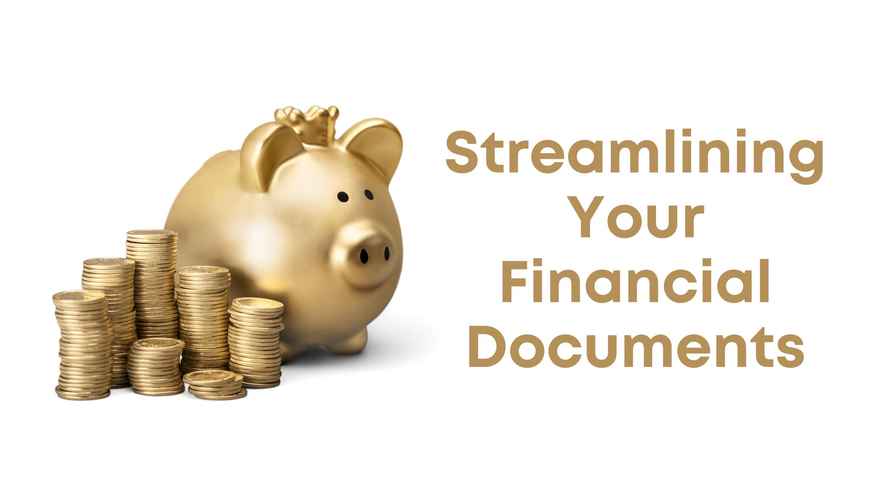Streamlining Your Financial Documents: A Path to Clarity and Savings

Managing financial documents has become more straightforward in an era where digital transactions are ubiquitous and paperless offices the norm. However, the reality for many is a cluttered digital desktop or a drawer stuffed with unopened bank statements and miscellaneous paperwork. This disarray is a physical nuisance and a barrier to financial clarity and efficiency.
Streamlining your financial documents is vital to taking control of your finances, uncovering potential savings, and paving the way for a stress-free financial future.
The Importance of Organization
Organizing your financial statements - bank or credit card statements, bills, or receipts - is about more than neatness. It's an exercise in financial fitness that can provide a clearer picture of your spending habits, help identify unnecessary expenditures, and ensure you are not losing money to bank errors or overlooked subscriptions. Furthermore, in the unfortunate event of disputes with your bank or creditors, having your financial documents in order can save time and frustration.
Step 1: Gathering Your Documents
The first step in streamlining your financial documents is to gather all your statements. This might involve downloading the last six months statements from your online banking and credit card portals if you're digitally inclined. If you prefer a more tactile approach or if you're dealing with a mix of digital and paper records, it's time to open those envelopes and get everything in one place.
Digital vs. Physical: Choosing Your Medium
Deciding whether to go digital or stick with physical documents is a personal choice that should align with your lifestyle and preferences. Digital files can be encrypted, backed up, and easily searched, making them a robust option for those concerned with security and ease of access. Physical files may appeal to those who prefer a tangible method of organization.
For Digital Files: Create a dedicated folder or cloud storage for financial documents on your computer. Organize files by type (bank statements, credit card statements, bills) and date. Ensure you have a reliable backup system, such as an external hard drive or cloud backup service.
For Physical Documents: Designate a specific file or drawer for your financial documents. Use folders or dividers to categorize documents by type and date. Consider investing in a small shredder or a service that can securely dispose of sensitive documents you no longer need.
Step 2: Sorting and Organizing
Once you've decided on your storage method, it's time to sort your documents. Start by discarding unnecessary paperwork, such as marketing materials, often accompanying bank statements. If you're going digital, this might involve deleting irrelevant files or emails.
Tips for Efficient Organization:
- Label everything clearly, whether using filenames on your computer or labels on folders.
- Keep a separate folder or file for tax-related documents for easy access during tax season.
Step 3: Regular Maintenance
The key to keeping your financial documents streamlined is regular maintenance. Set a reminder to download or file away new statements monthly. This habit prevents the pile-up of papers and makes it easier to keep track of your finances.
Reviewing Your Statements
With your documents now organized, the next step is to review your statements for the last six months. This review is crucial for several reasons:
- Spotting Errors: Even minor errors can add up over time. Look for any transactions that don't match your records.
- Identifying Unnecessary Expenditures: Regular subscriptions or memberships you no longer use are common findings. Cancelling these can lead to immediate savings.
- Fraud Detection: Early detection of fraudulent activity can prevent significant financial loss and the hassle of disputing transactions later.
Making Cancellations and Adjustments
Reviewing your statements might reveal services you no longer need or use. Cancelling these services can be empowering and financially beneficial. Similarly, promptly contacting your bank or service provider is crucial if you spot any errors or suspicious activity.
Benefits of Streamlining Your Financial Documents
The immediate benefit of organizing your financial documents is the peace of mind from knowing your financial affairs are in order. However, the advantages extend far beyond:
- Improved Financial Awareness: Regularly reviewing organized statements can heighten your awareness of spending patterns and financial habits.
- Increased Savings: Identifying and eliminating unnecessary expenditures directly impacts your savings.
- Enhanced Security: Properly disposing of sensitive documents and securely storing digital files can protect you from identity theft and fraud.
Streamlining your financial documents might initially seem daunting, but the clarity and control it brings to your financial life are invaluable. Establishing a system for organizing and regularly reviewing your financial statements safeguards your financial health and paves the way for a more secure and prosperous future. Remember, the goal of this exercise is not perfection but progress towards a more organized and financially aware self.
0 comments
Leave a comment
Please log in or register to post a comment